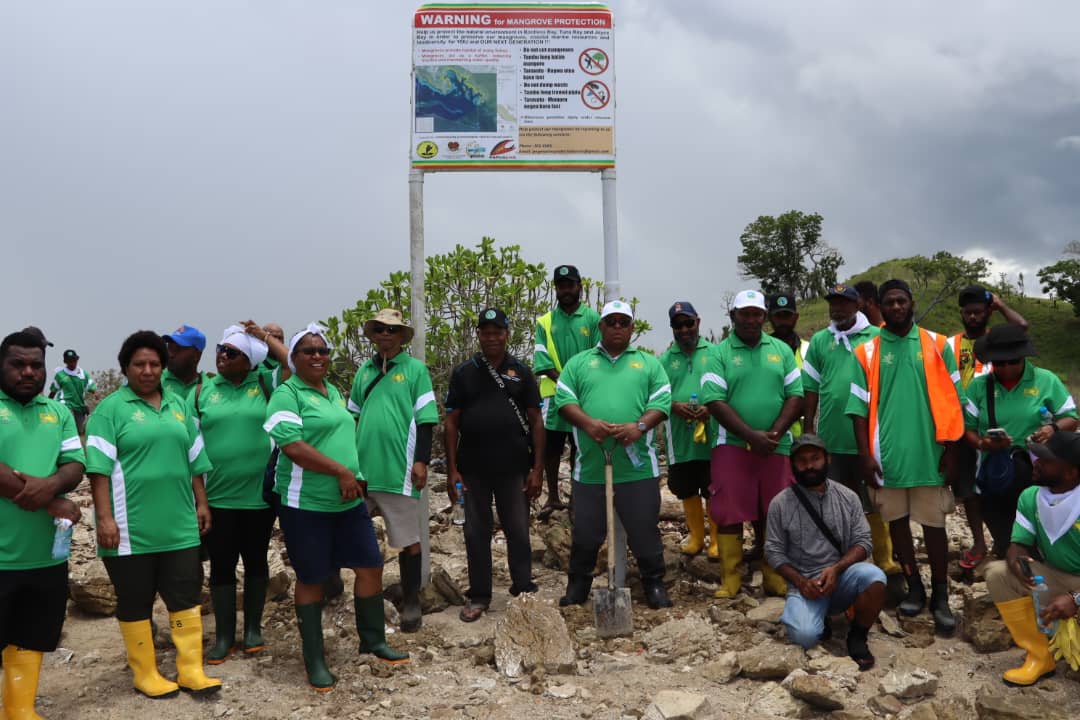Today, the Department of Prime Minister has officially launched an ambitious national initiative to plant 30,000 mangroves by the year 2030, in partnership with the Office of Conservation and Environment Protection Authority (CEPA) and the University of Papua New Guinea (UPNG).
This activity, held in Tahira, is part of the 50th Independence Anniversary celebrations, underpinning the importance of protecting the natural systems that sustain our people and our future.
In a ceremony at the breathtaking Bootless Bay, the Chief Secretary acknowledged the traditional landowners and custodians of the area for their invaluable stewardship and customary knowledge essential to conservation efforts.
“Mangroves are crucial to the ecological and economic health of our coastal zones. They protect our shorelines, act as nursery grounds for vital marine life, and serve as significant carbon sinks in our fight against climate change. By planting mangroves today, we are taking practical steps towards enhancing resilience for coastal communities, strengthening biodiversity, and honoring the environment that underpins our way of life,” the Chief Secretary stated.
Furthermore, Mr. Pomaleu has highlighted that this initiative is more than an environmental exercise; it is a strategic investment in the nation’s resilience and a commitment to international community goals. “Our presence here today is a response to the promises we’ve made globally regarding climate action and biodiversity,” he said.
Papua New Guinea has committed to several international agreements, including reducing carbon emissions and enhancing natural carbon sinks at the Climate COP and participating in the Kunming- Montreal Global Biodiversity Framework and this mangrove rehabilitation initiative is a cornerstone of achieving these commitments.
The Chief Secretary has called for collective action from all sectors – local communities, development partners, NGOs, and the private sector – to realize the target of 30,000 mangroves by 2030.
“Your knowledge, commitment, and contributions will be essential for the success of this initiative,” he said.
In a profound act of commitment, participants today planted over 400 mangrove seedlings at Bootless Bay. The event underscored the significance of ongoing stewardship, with a call for continued engagement in monitoring and supporting local regeneration efforts.
“Let the mangroves we plant today stand tall as living symbols of our nation’s resilience, unity, and commitment to a sustainable future,” he stated.
The Chief Secretary also emphasized the importance of respecting customary rights, conducting environmental assessments, and prioritizing sustainability.
Mr. Pomaleu concluded the address by reinforcing that the quality of the environment left for future generations is a measure of our nationhood.
The event also included a signboard erected to mark the launch of the National Mangrove Rehabilitation Initiative and also discussions with Executive Dean of School of Natural and Physicial Science, Professor Simon Saulei on the proposed UPNG Scientific Research Center on Motupore Island, once a historical site for the drafting of Papua New Guineas constitution to be rehabilitated into a modern scientific facility to cater for scientific research work on the Motupore Island and around the Bootless Bay coastal area.
Authorized by:
IVAN POMALEU, OBE
Chief Secretary






